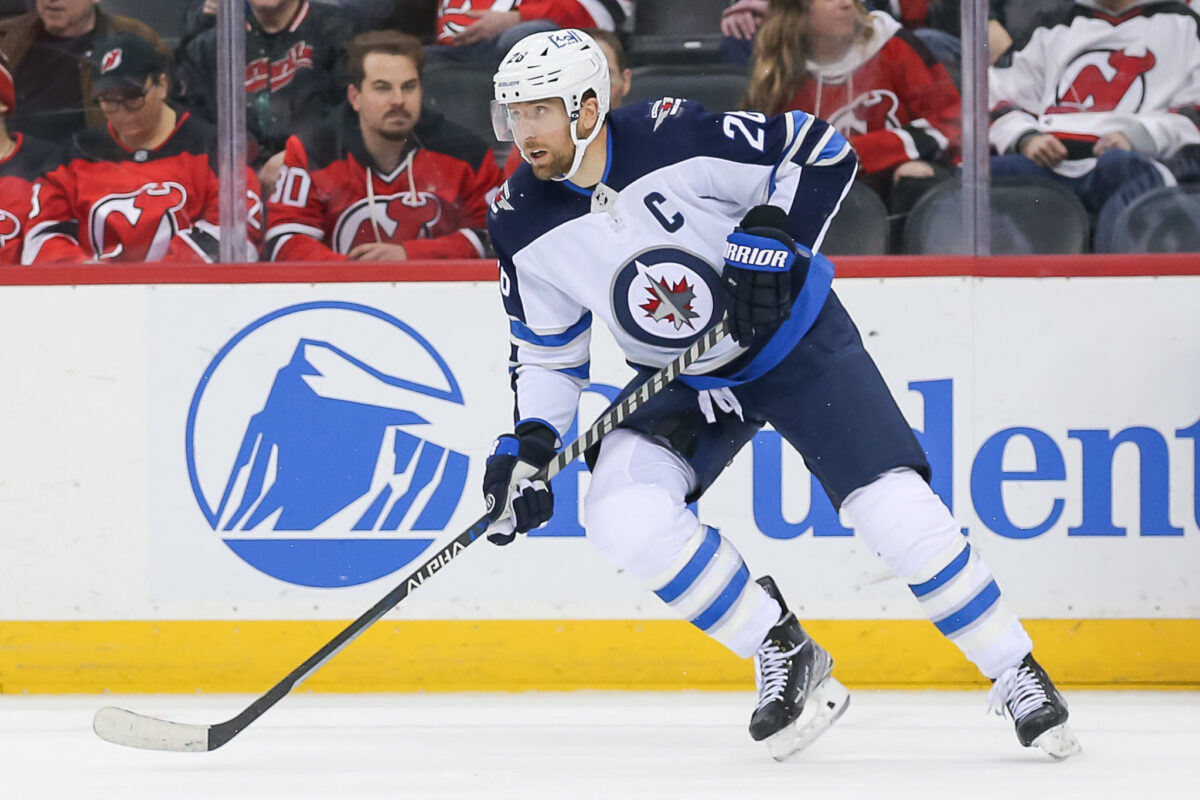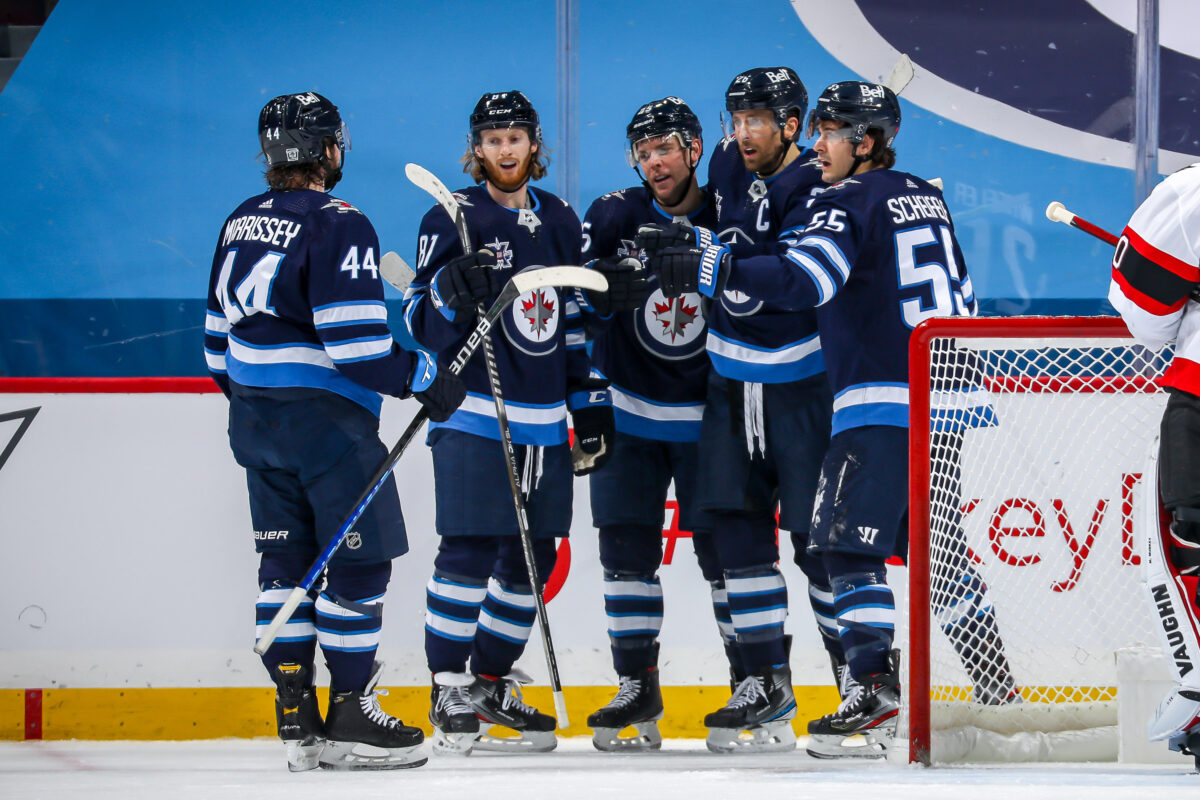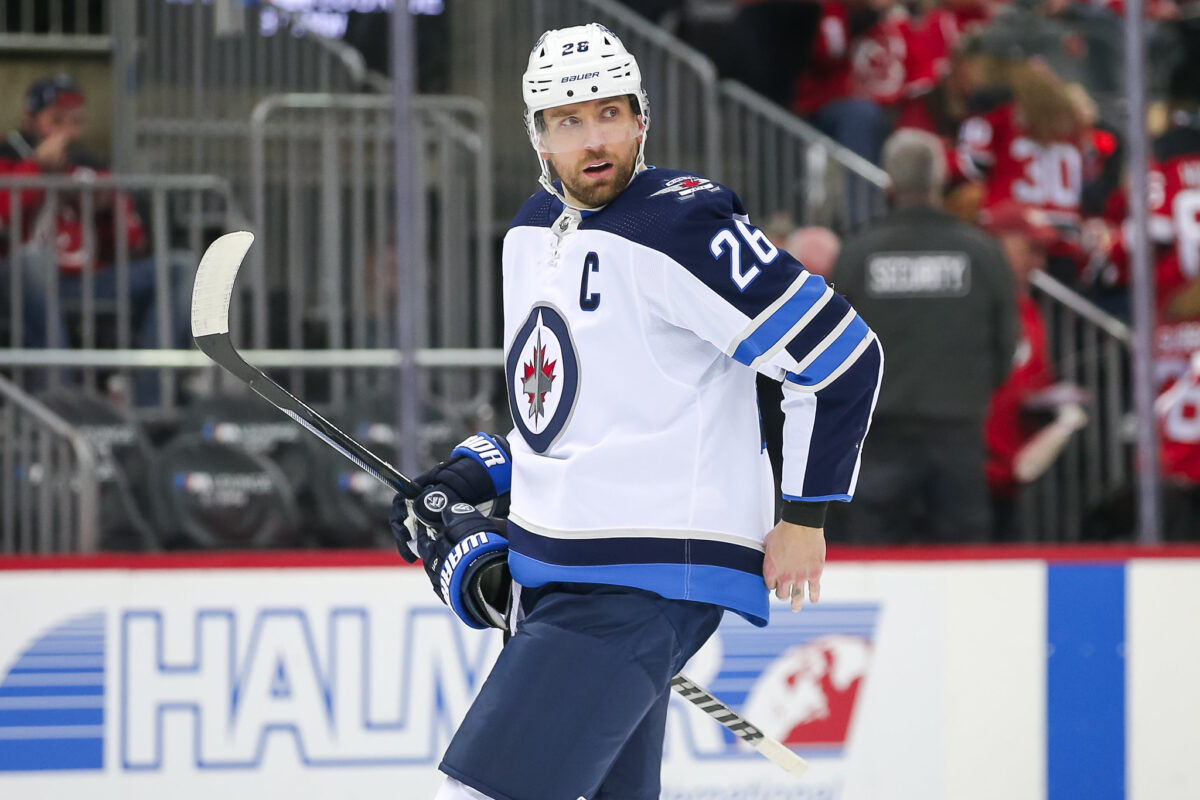The Winnipeg Jets’ 2021-22 season was a disappointment, as they came into the season considered a Stanley Cup contender but drastically underperformed, finishing sixth in the Central Division and well out of the playoff picture.
In this series, we’ll take a look back on the season, player by player, and grade their individual performances with an eye toward their future with the team.
If you’re going to do an assessment of Winnipeg Jets’ forward Blake Wheeler this season you have to look at three separate aspects of his game. His offensive contributions, his age and ability to keep pace with the game, and his leadership skills.

You also have to take into consideration that he missed two weeks due to COVID Protocol in October, as well as six weeks in December and January with a knee injury. With those factors in mind, here’s how Wheeler stacked up.
Wheeler’s Offence Was up to Standard
Wheeler had an incredibly slow start to the season, as he managed a single assist in his first two contests before testing positive for COVID-19 and subsequently missing the Jets’ next five games. Upon his return, he didn’t fare much better as he was only able to muster four assists in 13 games. It wasn’t until Nov. 27 against the Calgary Flames that he was able to record more than one assist in a game, and not until Dec. 10 for him to score his first goal against the Vancouver Canucks. In that 4-3 loss he had a hand in every Jets marker and ended the night with a goal and two assists, as he resembled the player that Jets fans had become accustomed to watching. It was also incidentally the same game he suffered his aforementioned knee injury and missed the next six weeks of the season.

Upon his return in late January, scoring was minimal again, as he put up dismal numbers with only a goal and three assists in his first eight games back. Then something happened, and Wheeler simply went off. Were his legs finally under him? Was he finally back into game shape? Who knows. The COVID virus hits every individual differently and that could have had a lasting effect on him. Then, add a significant injury on top of that and it could explain the uncharacteristic dry spell that he went through in his first 30 games. That night, Feb. 12 in Nashville, he scored twice and added three assists in a 5-2 road victory over the Predators and he didn’t look back.
Related: Jets’ Wheeler Could Be Playing Himself Into a Trade
In his final 35 games of the season, Wheeler scored 15 goals and 24 assists for 39 points. That’s a scoring rate of 1.14 points per game and very much worthy of someone earning $8-10 million. In today’s NHL, that’s the price you have to pay for a point per game player.
With 59 points in 64 games, #NHLJets Blake Wheeler, at age of 35, has best points-per-game average since the 2018-19 season. This, despite missing chunks of this year first with COVID, then a knee injury.
— Mike McIntyre (@mikemcintyrewpg) April 30, 2022
1G, 16A in 22 games before injury.
15G, 27A in 42 games since injury.
Wheeler struggled through a hard-luck, and offensively tortoise-like first half of the season, but he finished strong and at times when the Jets were knocking on the door of the final playoff spot, he was their best player. By the end of the season, he had 60 points in 65 games which translates to 76 points over a healthy 82-game campaign. Those are really good numbers considering he wasn’t truly himself until February.
Wheeler’s Age Was a Concern
At 35 years of age, there were concerns that Wheeler would lose a step. He did, but not in a way that seriously affected his offensive output. At his age, a loss of speed is a sign that the end of his career is on the horizon, but as mentioned above he had a very solid second half. The real problem for him was that he was misused by the Jets’ coaching staff. Paul Maurice continued to bang the drums of the Mark Scheifele – Wheeler combination and tried to give them first-line responsibilities in terms of ice-time and power-play duties when it was evident the leadership core of the team and offensive responsibilities were evolving over to the Kyle Connor – Pierre-Luc Dubois duo.

Unable to handle the heavy minutes and duties that he was a few years ago, Wheeler was better off when he was finally moved away from Scheifele, and put on a line with Nikolaj Ehlers and Paul Stastny. Wheeler himself said in his exit press conference that he was inspired to be playing with his new linemates.
“I think Paul (Stastny) eluded to it a little but there, you know like our particular line combination… too little too late. But you start to wonder, you know, what could have been.”
Blake Wheeler
It was obviously a good move, as Wheeler surged with Stastny and Ehlers, scoring seven goals in the final 12 games of the season, seemingly injecting new life into his older legs. He was one of the better Jets forwards in the second half of the year and showed the consistency that was missing in the first half.
Wheeler’s Leadership Was Questionable
Being the captain of a Stanley Cup contender, as the Jets were self-proclaiming in the preseason, comes with some real responsibility. Wheeler was not always up to that challenge. Let’s face it, the Jets’ season was a bust and the captain should be the one facing the music and representing his squad throughout a tough season. When it came to media presence, he was often unavailable. The player most often discussing the team’s woes in postgame scrums or pressers was Dubois.
During one first-period intermission against the Las Vegas Golden Knights, Wheeler was interviewed by TSN’s Sara Orlesky. She asked him about his reaction to the frustrated fans giving their team a Bronx Cheer after it took the Jets 15 minutes to simply get a shot on goal while the Golden Knights had already recorded 11. Without hesitation, he replied that the team was “pissed off.” Not exactly a captain or leader-type move. He later tried to brush it off as motivation from the fans but that’s not how it came off in real-time.
Presented without comment (mostly because this speaks volumes about how Blake and the #NHLJets feel about their fans. pic.twitter.com/mls8Ju7lhD
— Noted Hockey Analyst (@GameTimeArt) March 16, 2022
Later in the season, when questioned about the team’s leadership and how much of the Jets’ woes fell on the players wearing letters, Wheeler replied with “…when things go bad, it’s your fault. So I’m comfortable if you need to write a negative story, you can write it about me. No different than in the past.” Not exactly the professionalism and representation an NHL franchise expects from its captain. It was literally an adolescent answer to a reasonable question. He then proceeded to challenge Winnipeg Free Press reporter Jeff Hamilton by saying, “I mean, are you looking to get into a pissing match, you and I?” Was the captain accepting or dodging responsibility for the team’s performance?
Related Article: Jets’ Wheeler Takes Blame for Lost Season; Should Be Held Accountable
At the end of the season, Wheeler took responsibility for the team’s failure to meet expectations and mentioned it was his job to build the culture of the team. Another failure on his part. He claimed to build the culture of the locker room but didn’t demonstrate the willingness to follow through, and it’s now very evident the culture in the Jets’ locker room is in need of a serious fix going into 2022-23.
Wheeler’s Overall Grade: C-